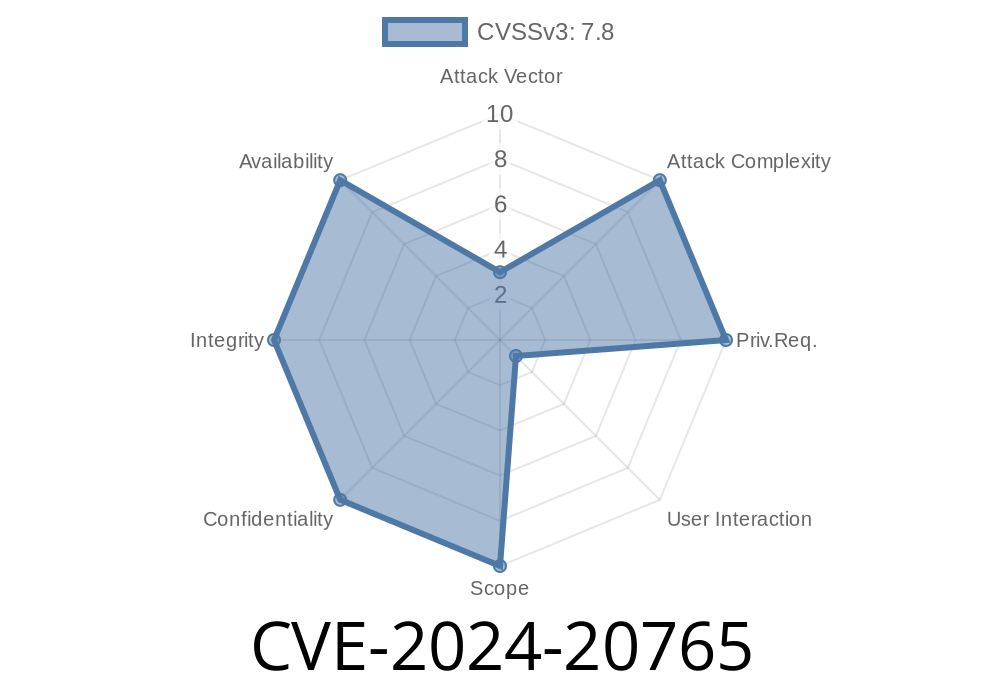In early 2024, a dangerous vulnerability—CVE-2024-20765—was disclosed by Adobe. This bug affects Acrobat Reader versions 20.005.30539, 23.008.20470 and earlier. It's a *use-after-free* vulnerability that can let an attacker *run any code* they want on your computer if you open a malicious PDF file. Let's break down what happened, how it works, and what you should do.
What Is a Use-After-Free Vulnerability, Anyway?
A *use-after-free* (UAF) is a kind of memory bug. When a program “frees” (lets go of) a chunk of memory but still uses it later, it can cause the program to crash or, worse, let hackers run their own code in place of the old data. Use-after-free bugs are notorious for enabling remote code execution (RCE) when crafted properly.
Affected Versions
According to Adobe’s security bulletin (APSB24-08), the following are at risk:
How Does CVE-2024-20765 Work?
CVE-2024-20765 exists because of a bug in the way Acrobat Reader handles certain PDF objects. Attackers can craft a PDF that, when opened, frees up memory but then tries to use that freed memory again. If they can sneak in code at the right time, Acrobat might execute *their* code with your user permissions.
The Exploit Flow in Simple Terms
1. Attacker creates a malicious PDF: Carefully builds the file to exploit the vulnerable code path in Acrobat Reader.
Victim opens the PDF: Acrobat processes the tainted objects.
3. Triggered UAF: Memory is freed by the app, but then attacked by the malicious PDF. The attacker’s “shellcode” is executed.
Here’s a basic example (not the Adobe code, but similar in principle)
#include <iostream>
using namespace std;
class Demo {
public:
void sayHello() { cout << "Hello world!" << endl; }
};
int main() {
Demo* d = new Demo();
delete d; // Memory is freed
d->sayHello(); // Use after free - bad programming!
return ;
}
In Acrobat Reader, a similar logic error is buried inside PDF parsing. Malicious PDFs can exploit this to execute arbitrary code.
Public PoC (Proof-of-Concept)
As of writing, no full public proof-of-concept is available, as it would be dangerous. However, a typical Acrobat UAF exploit drops shellcode following PDF object heap spraying (filling memory with attacker’s code), then triggers the UAF bug to jump to the shellcode.
Example resources on similar PDF exploits:
- https://attackerkb.com/topics/qvawMJDRbb/cve-2018-4993
- https://cve.mitre.org/cgi-bin/cvename.cgi?name=CVE-2024-20765
Protect Yourself
- Update Acrobat Reader: Always upgrade to the *latest* version. Adobe has patched this in recent releases.
Original References
- Adobe Security Bulletin APSB24-08: Acrobat and Reader
- NVD: CVE-2024-20765
- MITRE: CVE-2024-20765
Conclusion
CVE-2024-20765 is a serious security flaw in Acrobat Reader that can be triggered just by opening a PDF. Users should *update immediately* and not trust unknown PDFs. Stay alert and keep your software updated—that’s your first line of defense!
---
*If you found this writeup helpful, share it to help others stay safe online.*
Timeline
Published on: 02/29/2024 17:15:07 UTC
Last modified on: 02/29/2024 18:06:42 UTC
